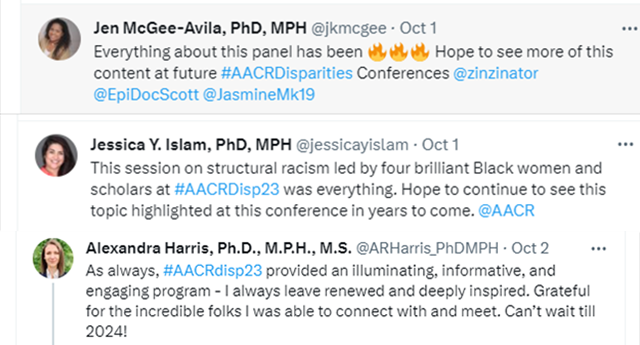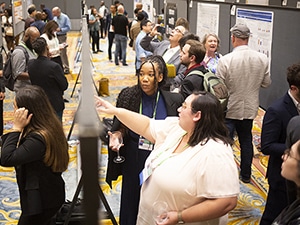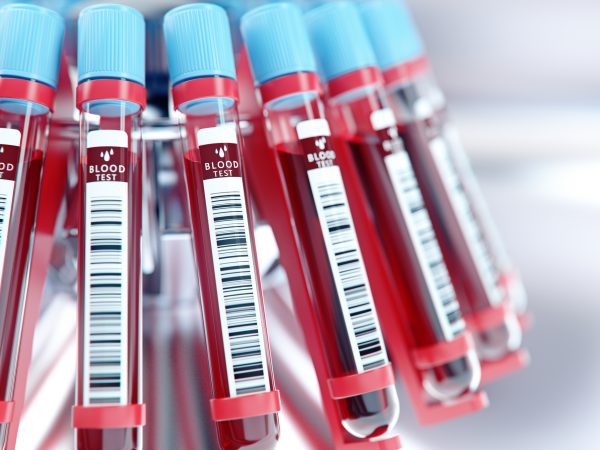AACR Meeting Highlights Progress Against Cancer Health Disparities
AACR is a pioneer in the study of racial/ethnic and other disparities in cancer research and care. The 16th AACR Conference on the Science of Cancer Health Disparities in Racial/Ethnic Minorities and the Medically Underserved, held September 29-October 2 in Orlando, Florida, is a pivotal part of AACR’s efforts to end cancer health disparities. This year, the meeting featured more than 40 invited talks from experts in the field, more than 450 abstracts presented as posters or short talks, as well as a robust patient advocacy program.
The conference was held for the first time in 2007, and it has only grown in prominence since then.
This year’s conference opened with a spotlight on three individuals who are working to lessen disparities in cancer care. Danielle Carnival, PhD, from the White House, updated attendees on the Cancer Moonshot and spoke of the importance of building trust within marginalized communities. Aki Smith spoke of her father’s struggles with navigating the health care system during treatment for cancer and her current efforts to help other patients do the same. Finally, Folakemi Odedina, PhD, was recognized for her decades of work addressing disparities in prostate cancer and recruiting diverse patient populations into clinical trials.
Remarks from all three speakers were summarized in a recent blog post and in an article by Cancer Today, which is published by AACR.
This conference earned news coverage and social media buzz as researchers documented the progress in addressing disparities and the work that remains to be done.
Attendees responded enthusiastically to the presentations and discussions, with more than 230 social media users pumping out over 772 tweets that racked up more than 7.7 million impressions. (The official hashtag is #AACRdisp23.)

News media covered the event closely, keying in on high-profile findings of the impact and causes of disparities in cancer health.
In one of many stories on the conference, the ASCO Post reported: “Racial minority patients are impacted differently by the social and physical characteristics of their environments, which may negatively affect cancer outcomes compared with white patients with cancer, according to a new study by Robinson-Oghogho et al. presented during the 16th AACR Conference on the Science of Cancer Health Disparities in Racial/Ethnic Minorities and the Medically Underserved. Addressing these disparities necessitates incorporating processes and tools that tackle structural racism, concluded the study authors.”
Scientific Program Shed Light on Advances and Ongoing Challenges
The broad scientific program exemplified the varied approaches researchers have taken to identify, understand, and address disparities in cancer health.
Plenary sessions explored cancer care among Indigenous populations (as captured in a blog post), progress on the Cancer Moonshot, the impact of structural racism on disparities, efforts to increase diversity in clinical trials, disparities associated with persistent poverty and rural communities, and the use of big data and artificial intelligence to reduce disparities. A special session that explored the impact on cancer disparities of laws against diversity, equity and inclusion (DEI) initiatives was featured in a blog post.
Proffered presentations touched on similar themes. Select studies from the proffered presentations are described below.
Understanding the Lack of Representation in Clinical Trials
One study illustrated that while the majority of surveyed patients in the Philadelphia area were open to participating in clinical trials, those from racial/ethnic minorities were significantly less likely to do so. Reasons for not participating in clinical trials included fear of side effects, concerns about the drug’s efficacy, lack of awareness of trial locations, mistrust of physicians and/or the pharmaceutical industry, and concerns about the amount of time required. The study could inform clinical trial recruitment strategies, the researchers noted.
Despite ongoing challenges, findings from another study offered some hope. The analysis of over 20 years of clinical trial data found that National Cancer Institute-sponsored cancer clinical trials have become more diverse in recent years, with greater representation of older patients, racial/ethnic minorities, and patients from historically underrepresented regions of the U.S. The researchers speculated that the greater number of available early-phase clinical trials, changes to eligibility criteria, and an increase in the number of small sites offering clinical trials may have contributed to the increased diversity of clinical trial participants in recent years.
Identifying Disparities and Underlying Factors in Underserved Communities

Researchers continue to uncover factors that contribute to cancer health disparities. One study suggested that awareness of risk could be one factor. The researchers found that a large portion of surveyed Spanish-speaking men in the LGBTQ+ community were unaware that infection with the human papillomavirus (HPV) could cause cancer or that men could be infected with HPV. They were also less likely to be offered HPV vaccination, which could put them at an increased risk of HPV-related cancers.
Another study found that certain racial/ethnic minority patients undergoing breast cancer treatment were less likely to receive palliative care, which is intended to relieve discomfort associated with cancer or cancer therapy and is associated with improved quality of life and longer survival.
Structural racism may also contribute to the increased cancer mortality among racial minorities, according to another study. Researchers found that factors such as residential segregation, incarceration, employment, economic status/wealth, and education were associated with increased county-level cancer mortality rates among minority populations compared with whites.
AACR Continues to Work Toward Achieving Cancer Health Equity
The AACR Cancer Health Disparities meeting is held once a year, but addressing disparities is a year-round priority for the AACR. From issuing the biennial Cancer Disparities Progress Report and highlighting disparities research in its peer-reviewed journals and scientific meetings to supporting minority researchers in career development and research funding, AACR continues to take a multipronged approach toward achieving cancer health equity.



